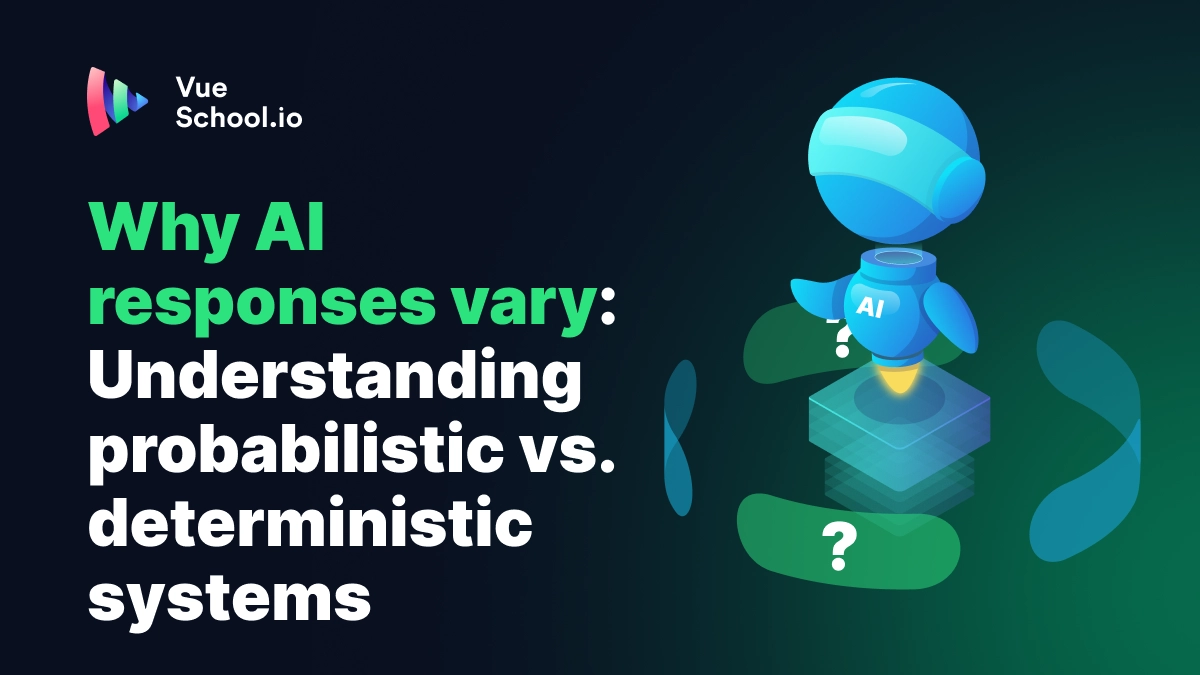Why AI responses Are Never the Same and How to Fix It for Developers

Introduction
Ever asked an AI like ChatGPT or Gemini a question and got a vague or off-topic answer? It’s frustrating when tools like GPT-4o, Claude, Grok, etc., don’t deliver what you need.
This guide explains why AI struggles to answer questions and shares practical ways to improve its responses. You’ll learn how to make AI work better for your projects, whether you’re coding a Vue.js app or tackling general web development tasks.
After reading this article, you’ll:
- Know why AI answers can be vague or wrong.
- Learn simple tricks to get better AI responses.
- Apply AI fixes to web development projects.
- Find resources to master AI-driven coding.
Why AI Struggles to Answer Questions
AI systems like ChatGPT (GPT-4o), Gemini, Claude, and Grok are powerful but sometimes miss the mark. They’re built on large language models (LLMs) that predict words based on patterns from massive datasets, like web pages or code. They don’t think like humans, they guess what’s likely to come next. Ask, “How do I optimize a Vue.js app?” and you might get a generic list of tips instead of specific advice. This happens because LLMs lack true reasoning and struggle with complex or unclear questions. Some people note Claude excels at writing but still falters on nuanced queries, while Grok lags in tasks like image generation.
Common Issues:
- Generic answers that miss your specific needs.
- Wrong facts from overgeneralizing patterns.
- Confusion with vague or complex questions.
- No real-world reasoning to filter bad outputs.
What’s Behind AI’s Limitations
LLMs work by breaking your question into tokens, like words or code snippets, and predicting the next ones based on training data. For example, GPT-4o might see “Vue.js performance” and pull from blog posts, not your app’s context. They don’t understand intent like humans do; they match patterns. If your question is broad, like “Make my site faster,” Claude or Gemini might churn out unrelated tips. They also lack critical thinking to judge if an answer fits. This is why a chatbot in a Vue.js app might ramble instead of answering a user’s question directly.
Key Causes:
- Pattern matching, not reasoning, drives answers.
- Limited context from your question’s tokens.
- Over-reliance on old or broad training data.
Practical Ways to Get Better AI Answers
You can make AI systems like GPT-4o, Claude, or Gemini give better answers with simple tricks. Let’s see some of them:
Write Clear, Specific Prompts
Vague prompts get vague answers. Instead of “Help with Vue.js,” try “Suggest ways to optimize Vue.js Composition API for a blog app.” The more detailed you are, the better results you’re going to get. Be specific about your goal, like reducing load time or debugging a component.
Add Context
Give AI the background it needs. For a Nuxt.js chatbot, include details like “The app uses useFetch for API calls and needs a chatbot for product Q&A.” This helps Gemini or GPT-4o or whatever else you may be using, tailor answers to your project’s tech stack.
Iterate and Refine
If Grok’s answer is off, ask follow-up questions. For example, if it suggests generic SEO tips, ask, “How do I apply these to Nuxt.js server-side rendering?” Iterative prompts narrow down responses, improving accuracy.
Validate Outputs, Always
AI can make mistakes, like wrong code or facts. Always check outputs against trusted sources, like Vue.js docs. Or the best way to validate output is to run the code and see if it does the intended thing. If it does, then you can use AI to help write tests to prevent regressions in the future of that intended functionality. Also, you can ask the LLM to “act as a security expert” and review the code for security flaws.
Tips for Better Results:
- Use specific, detailed prompts for your project.
- Provide context, like your app’s framework or goal.
- Ask follow-ups to clarify vague answers.
- Check AI outputs against reliable sources.
AI in Web Development
For Vue.js developers, better AI answers mean better apps. Imagine building a chatbot for a Vue.js portfolio. A vague prompt like “Write a chatbot” might give you generic JavaScript. Instead, ask your favorite AI, “Create a Vue.js component for a chatbot using the JS built-in fetch function to call an OpenAI API.” This gets you code closer to your needs. Always review outputs to avoid errors, ensuring your app’s features work smoothly. These tricks apply to any project, from React and JavaScript to Rust and Java.
Challenges and Fixes
AI’s limitations can be frustrating. GPT-4o might suggest outdated Vue.js syntax, while Grok struggles with complex tasks. Vague prompts lead to useless answers, and biases in training data can skew results. Fix this by starting with small, clear prompts and testing outputs in your IDE.
If an AI tool’s cost adds up, try free options like Perplexity or Google Gemini CLI for code suggestions.
These steps should keep your project on track, but there is something more: Daniel Kelly held an amazing workshop where he spoke about AI Driven Development (AIDD) but also shared numerous tips about writing better code with AI. You can the full workshop on Vue School’s YouTube channel, here.
Conclusion
AI systems like ChatGPT, Gemini, Claude, and Grok can stumble on questions, but clear prompts and careful checks make them powerful for developers. Whether you’re building a Vue.js chatbot or tweaking a Nuxt.js app, these tips save time and boost quality.
Join AIDD’s community, part of BitterBrains.com, for more coding insights. If you’re looking to elevate your skills and better incorporate AI into your workflow, check out AIDD's upcoming course.
Start learning Vue.js for free

Comments
Latest Vue School Articles
Just Released: Nuxt Hub Multi-Vendor and First-Class DB

Vue.js – 2025 In Review and a Peek into 2026

Our goal is to be the number one source of Vue.js knowledge for all skill levels. We offer the knowledge of our industry leaders through awesome video courses for a ridiculously low price.
More than 200.000 users have already joined us. You are welcome too!
© All rights reserved. Made with ❤️ by BitterBrains, Inc.



